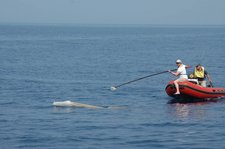
Sensible behavioral responses of an animal to the environment depend critically on the capability to sample the surroundings with a suite of sensory systems. Most senses are passive where specialized receptor cells are sensitive to intrinsic energy from the surrounding environment, such as light and sound. In contrast, a few senses, such as echolocation, are active: the animal itself produces the energy that it subsequently detects after convolving it with the environment. With this AIAS Skou fellowship I wish to harness the tremendous synergy from integrating parallel studies of how echolocating animals sense actively with sound into a big picture framework of how animals in general use sensory-motor feedback processes to actively adapt their perception via active sensing.
Project title:
Adaptive perception through active sensing
Area of research:
Sensory physiology
Fellowship period:
1 Feb 2018 – 31 Jan 2019
Fellowship type:
Jens Christian Skou fellow

This fellowship has received funding from The Aarhus University Research Foundation.

Tagging of whale with multicensor Dtag